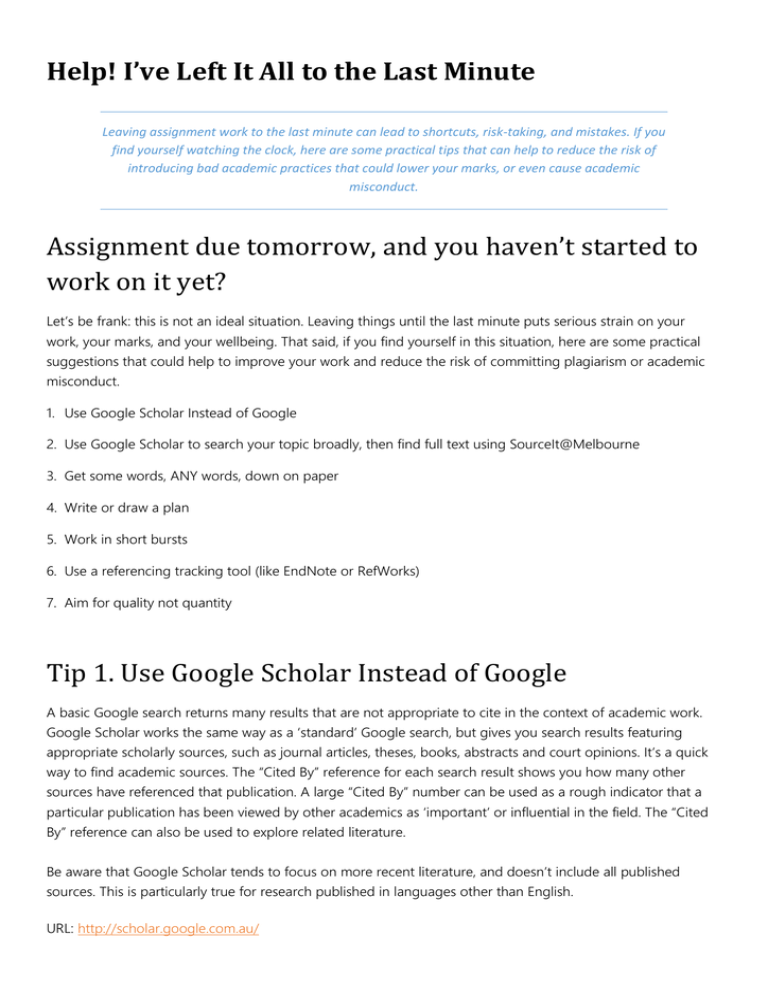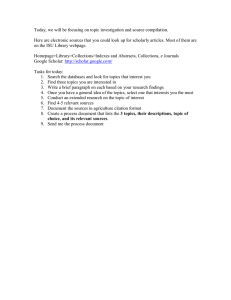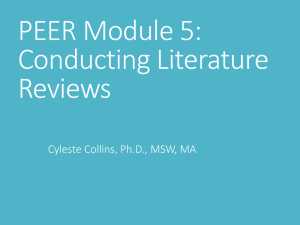Help! I`ve Left It All to the Last Minute Assignment due tomorrow, and
advertisement

Help! I’ve Left It All to the Last Minute Leaving assignment work to the last minute can lead to shortcuts, risk-taking, and mistakes. If you find yourself watching the clock, here are some practical tips that can help to reduce the risk of introducing bad academic practices that could lower your marks, or even cause academic misconduct. Assignment due tomorrow, and you haven’t started to work on it yet? Let’s be frank: this is not an ideal situation. Leaving things until the last minute puts serious strain on your work, your marks, and your wellbeing. That said, if you find yourself in this situation, here are some practical suggestions that could help to improve your work and reduce the risk of committing plagiarism or academic misconduct. 1. Use Google Scholar Instead of Google 2. Use Google Scholar to search your topic broadly, then find full text using SourceIt@Melbourne 3. Get some words, ANY words, down on paper 4. Write or draw a plan 5. Work in short bursts 6. Use a referencing tracking tool (like EndNote or RefWorks) 7. Aim for quality not quantity Tip 1. Use Google Scholar Instead of Google A basic Google search returns many results that are not appropriate to cite in the context of academic work. Google Scholar works the same way as a ‘standard’ Google search, but gives you search results featuring appropriate scholarly sources, such as journal articles, theses, books, abstracts and court opinions. It’s a quick way to find academic sources. The “Cited By” reference for each search result shows you how many other sources have referenced that publication. A large “Cited By” number can be used as a rough indicator that a particular publication has been viewed by other academics as ‘important’ or influential in the field. The “Cited By” reference can also be used to explore related literature. Be aware that Google Scholar tends to focus on more recent literature, and doesn’t include all published sources. This is particularly true for research published in languages other than English. URL: http://scholar.google.com.au/ Tip 2. Use Google Scholar to search your topic broadly then find full text using SourceIt@Melbourne If you’re connected to UniWireless or are using a university computer you might be able to find full text versions of Google Scholar results with just a couple of clicks! Put your search terms into Google Scholar and check the right hand side of the search results page. Does it say SourceIt@Melbourne? Click that and you can access full text using University database subscriptions. If you’re not connected to UniWireless, there’s just one extra step you need to include. Have your database of choice open in one window (connect through the Unimelb library website) and Google Scholar open in another. Search broadly in Google Scholar, then throw the specific details of the papers you want into the database. Full text should be available for most English-language journal articles. Tip 3. Get Some Words – Any Words – Down On Paper Starting to write is usually the hardest part of an assignment, so any words you can put down will help to push you over the starting line and towards a conclusion. Whether or not you write on paper or in a word processor, the most effective way to start is often to write down some thoughts. Set aside 20 minutes, and get some words down - even if the words are incomplete, half-formed phrases. At this stage, you should not be focused on the evidence that you will include, or the sources you will cite. You should focus on your ideas about the argument you want to make in your writing. Don’t spend too long on this activity. If you are a visual person, you might like to write down each sentence, or each idea, on a Post-It note. Then you can reposition the notes in a way that makes sense to you. Seeing some actual words on paper, or on screen, should help boost your confidence. Tip 4. Write (or Draw) A Plan Writing an assignment without a plan is like driving to an unknown destination – with no GPS. Think of a writing plan as a ‘road map’ for how you will finish the written assignment. It should help you to prioritise limited time in the most effective way. An effective writing plan starts with a thesis sentence: a sentence or two that answers a research question (or essay question), or that states a claim. It then follows this up with a sequence of main points, ordered in a logical fashion; once included, each main point should then be expanded and backed up with evidence that boosts the main argument. Writing a plan should help you to identify – fast – whether there are any points where your argument lacks evidence. A writing plan provides the structure that will help you organise messy and half-formed ideas into a logical and persuasive sequence. If you’re a visual person, you might prefer to draw a ‘mind map’ to show how the ideas or themes in your assignment should link together. If you’re more text-oriented, then a simple list of headings will do the trick. The structure of your plan will also be influenced by the type of written assignment: reports, essays, and reflective journals (for example) each have their own structure. Essays usually include an introduction, discussion, and conclusion. Every paragraph should have a purpose, and a good way to set this out is to write one sentence for each paragraph as a preliminary plan. Then come back and elaborate each of these sentences into a fully formed paragraph. URL: http://www.lc.unsw.edu.au/onlib/pdf/essayplan.pdf Tip 5: Work in Short Bursts When you’re working on something at the last minute, it’s easy to get overwhelmed by the magnitude of the task. Working in short bursts of 30-40 minutes will help you to manage your energy and stress levels. In a similar vein, some writers respond well to self-imposed deadlines. If this works for you, you might like to set yourself some small goals and give yourself a ‘reward’, such as taking a short break to check email or Facebook, every time you tick one item off your list (such as finishing a paragraph, or a section). Taking regular breaks from work to eat, drink, and relax, will also help you to work smarter. You might think you’ve only got time to eat junk food at your desk, but joining your flatmates or family members for a meal is a great way to refresh your brain, and will actually help you to work more productively. When we sit down for long periods, our circulation is reduced, and less oxygen reaches the brain. Aim to take a short 5-10 minute break every hour, where you get up, stretch, and walk around, away from your desk. Taking regular microbreaks of just 20 seconds can also help to prevent eye strain and muscle fatigue. Tip 6: Use a Reference Tracking Tool (like EndnoteWeb or Zotero) What’s the single study technique most likely to lead to unintentional plagiarism? Odds are, it’s making notes on a reading, but forgetting to note down the essential publication details, and whether your notes are verbatim quotes or paraphrases. References tend to accumulate in many places: on scraps of paper, in course readers, on lecture notes and handouts, in diaries, in notebooks, and in files on USB drives. It’s easy to lose track of them, and this can create problems down the track—particularly when it’s two hours until hand-in, and you can’t find the page number for that essential quote from Helena Blavatsky. Say you are working in the library, and then move to a Faculty computer lab when the library closes, and then finally go home (where you plan to keep on working) when the lab closes: a web-based bibliographic tool ensures that all of your references are available, wherever you need them. Most will also produce wellformatted bibliographies for you, based on your saved records. For tips on how to avoid last-minute referencing panic, check out Help Me Now: How to keep track of references. URL: http://www.zotero.org/support/quick_start_guide http://endnote.unimelb.edu.au/home/about/what_is_endnote_web Tip 7: Aim for Quality not Quantity The word limit for you assignment is an upper limit, not a goal! If you’ve been set a 1,500 word analysis, your tutor would much prefer to read a snappy, informative and well-written 1000 word submission than a convoluted and repetitive 1,500. If you’re really stuck for time, bullet points of key information is preferable to including no information at all. Important! Take Care of Yourself When you are in a rush, and particularly when you are tired and stressed, you are more likely to make unintentional mistakes, and more likely to adopt dubious study strategies that can put you at risk of committing academic misconduct. Taking shortcuts, for example, can mean that assignment work is not completed as requested; that questions are misinterpreted or not answered correctly; or that key elements are missing. And when work is completed in a rush, there is often little or no time for revision and fine-tuning: that can make the difference between a Fail and a Pass, or it can turn good work into great work. The problems and the stress of doing it all at the last minute can be avoided with better planning and time management. Further Reading / Resources Tips on time management: http://services.unimelb.edu.au/__data/assets/pdf_file/0009/470907/Managing_tasks_and_time_Update_051112.p df Tips on stress management: http://services.unimelb.edu.au/__data/assets/pdf_file/0004/361390/ManagingStress2010.pdf Tips on procrastination: http://services.unimelb.edu.au/counsel/resources/resources/psychological/procrastination Tips on wellbeing: http://healthy.unimelb.edu.au/uom/index.htm


